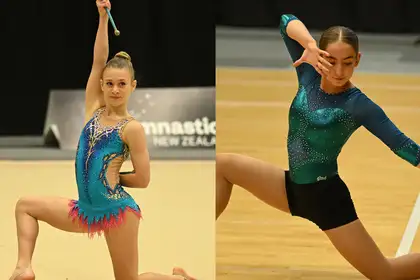
Photos supplied by Gymnastics New Zealand.
The study, led by Dr Rachel Batty in conjunction with Dr Claire Badenhorst and Associate Professor Andrew Foskett, examined the perspectives, decision-making processes and directives relating to female sport uniform designs from a New Zealand National Sports Organisation (NSO) perspective.
The findings indicate that the design of the uniform could contribute to increased female athlete anxiety, particularly around body image, visibility of menstrual blood and visibility of underwear while wearing their uniform.
Dr Batty says the role of the NSO in the creation of uniforms was also examined.
“Just five per cent of sports bodies felt their current uniform design could impact players’ mental wellbeing, and a number of NSO representatives interviewed were unsure if their uniform designs were affecting their female athletes in any way.”
The research has strengthened a recent decision made by Gymnastics New Zealand to overhaul their competition attire rules after the revelation that body image was considered the greatest issue for New Zealand gymnasts in regard to sport uniform design.
“Our study found that 37.8 per cent of sports felt decisions about female sport uniform designs should predominantly lie with the athletes. That’s exactly what Gymnastics New Zealand has done with their survey of close to 300 gymnasts,” Dr Batty says.
Competitive gymnasts in all codes in New Zealand can now wear shorts over their leotards and will no longer face penalties for issues like having a visible bra strap following an overhaul of the sport’s attire regulations.
“The changes are about making athletes – the majority of whom are young females – feel comfortable and safe and ensuring the sport is fully inclusive,” Gymnastics New Zealand chief executive Andrea Nelson says.
In acknowledging the contribution of wider New Zealand sports sector to the study, Dr Batty noted that there was an opportunity for NSOs to work together on the issue, through round table discussions and comparing approaches.
“Gymnastics New Zealand could be used as a successful case study in this regard,” Dr Batty says.
“Such an initiative has the potential to boost awareness of the issue across the sector and aid in supporting those sports and organisations who may recognise the issues relating to female athlete unform design, but are unsure if it applies to them.”
Related news
Partnership to provide tauira better access to period products
A collaborative effort is underway to help reduce mental and physical health impacts faced by tauira when trying to access safe and hygienic menstrual products.

Research delves into heat stress response in athletic females
The way the female body responds to exercise-heat stress, especially when considering ovarian hormone profiles, is an area of research that Dr Lizzie Zheng found to be lacking.

Senior Lecturer recognised as emerging researcher by Health Research Council
A research project looking at menstrual cycle status and iron deficiency diagnosis in healthy females has been awarded an Emerging Researcher First Grant by the Health Research Council (HRC) of New Zealand.
